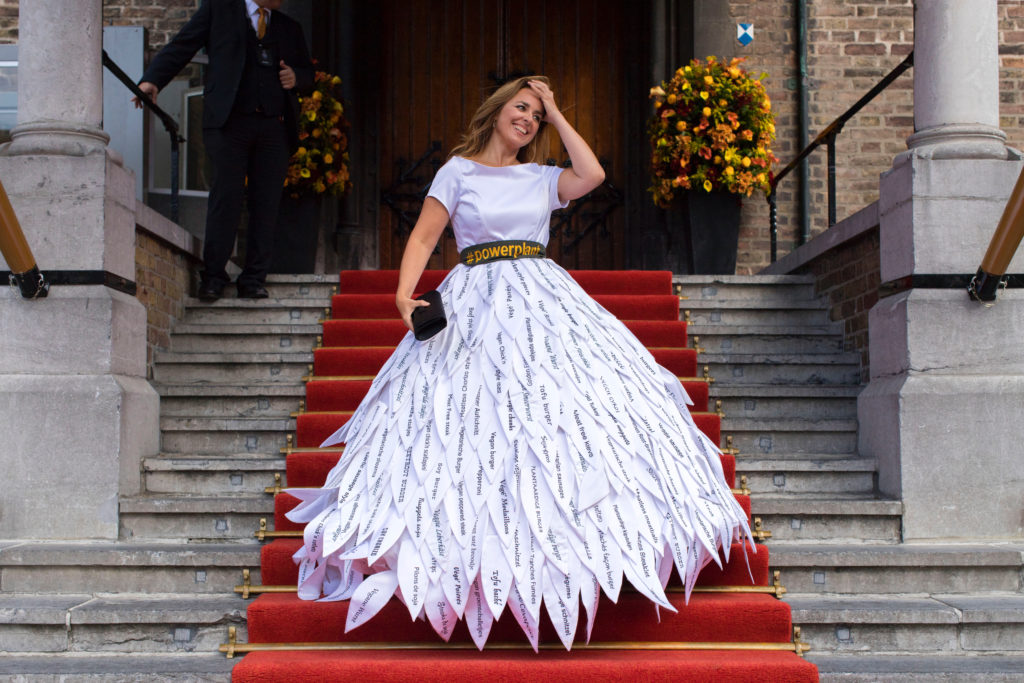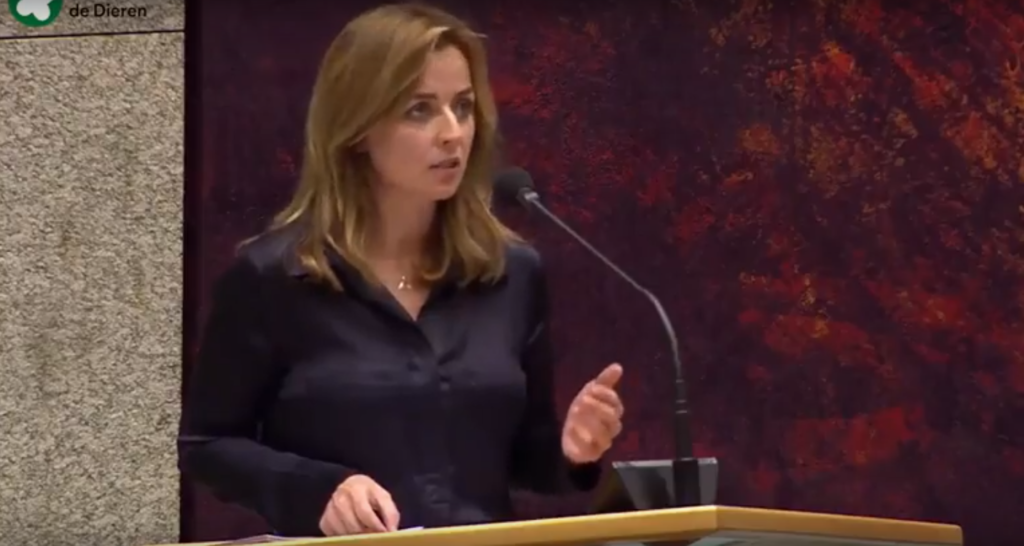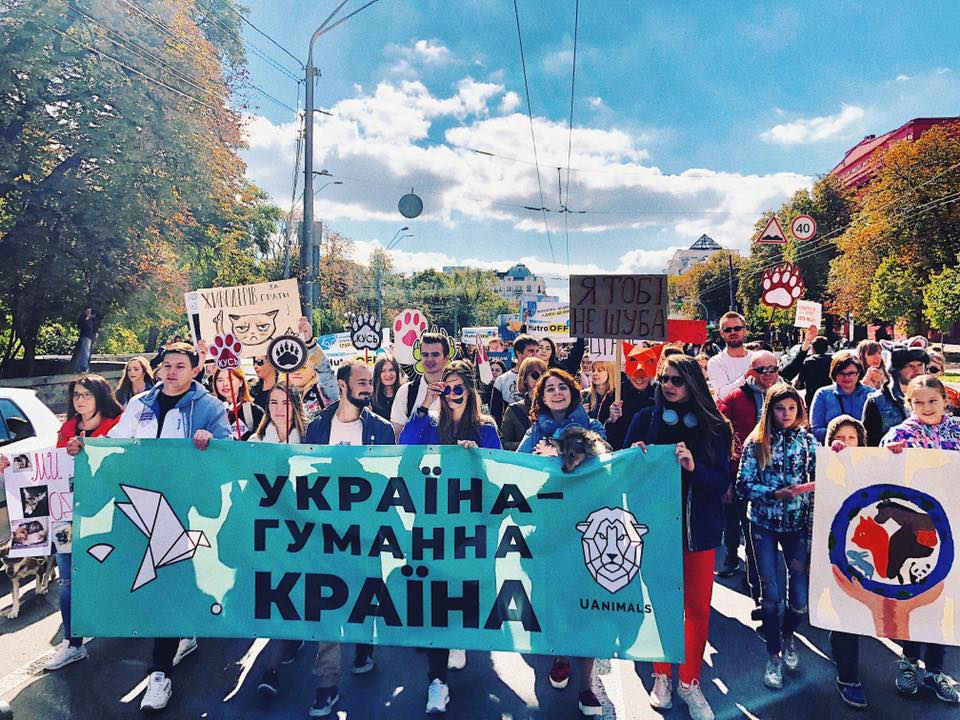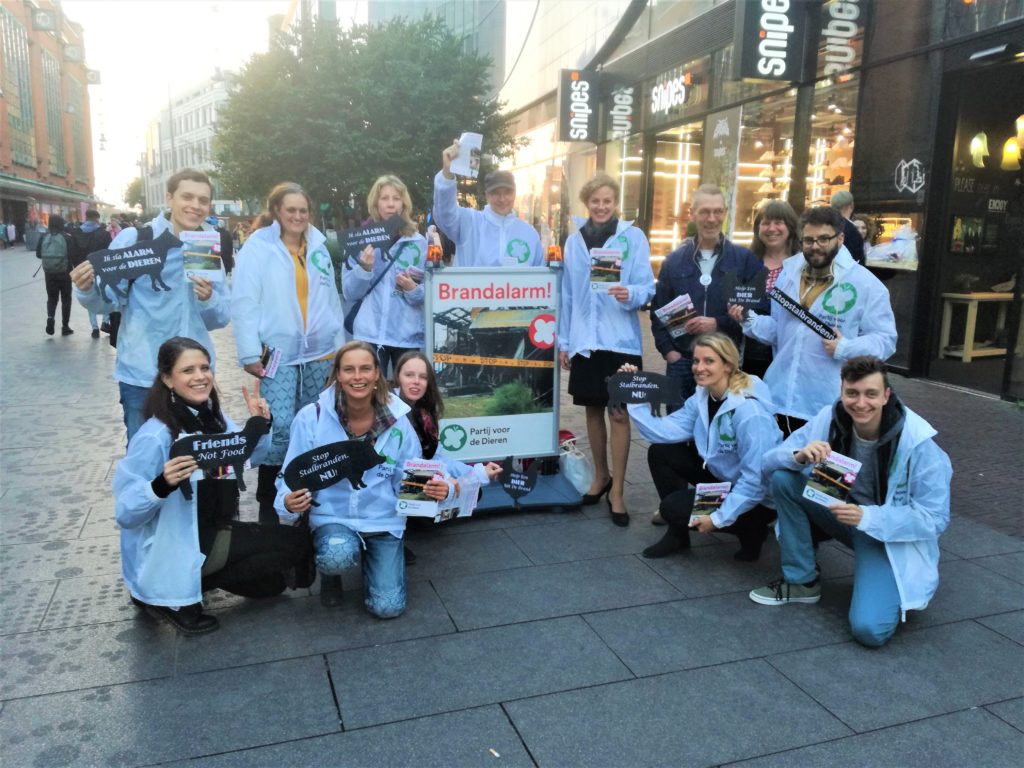Worldlog Marianne Thieme 9 ottobre 2018
This year was the tenth time in a row we used Prinsjesdag, the most important political event in the Netherlands, to make a political statement. On Prinsjesdag, which is held every year on the third Tuesday of September, the Dutch government presents its plans for the upcoming parliamentary year. It’s customary for participants to dress in suits and fancy dresses on this day, but we want our outfits to also carry an important message.

Marianne in her ‘Vegetarian Meat Dress’ on Prinsjesdag. The dress was designed by Yasmina Ajbilou, who focuses on zero waste fashion.
I wore a dress carrying all imaginable names of vegan and vegetarian meat products currently on the market in Europe – now that I was still allowed to. Worldwide, lobbyists for the meat industry are looking for ways to remove plant-based meat substitutes from the market or make the names of the products illegal. The last convulsions of the meat industry, which clearly feels the market of cruelty-free products breathing down its neck.
The waistband of the dress carries the name of our new documentary, Powerplant. And I can hereby tell you that filming has been completed! The documentary is about the transition to a plant-based and animal-friendly society and will be released at the beginning of 2019. Around the same time, my new book on idealistic politics will be published. I cannot wait to share all this with you!
After Prinsjesdag, the state budget was discussed in the Dutch Lower House. The government’s explanatory notes on the budget, mainly consisting of self-satisfied political propaganda, proved a missed opportunity. The government congratulated itself on irrelevant figures while passing down the truly important matters, such as a strong and honest environmental policy, to other parties. Why not use the tax reform to give carbon emission its real price? Why not use the VAT increase to make sustainable consumption cheaper and non-sustainable consumption more expensive? Instead of having large companies pay to make the Netherlands sustainable, it is now mainly the citizens that are forced to cover the costs.

Our government has passed down the bill to our children and grandchildren. It has made sustainability the responsibility of companies and social organisations, and it has shied away from legal sanctions. It has been three years since Paris, and we are still making our decisions together with companies, gradually losing sight of our goals. Allowing large companies to take part in the decision-making on laws and regulations that might well increase their costs is never going to work; just as you would not allow an offender to decide on the severity of their own punishment. The same goes for agricultural policies.
Agriculture, specifically livestock farming, is facing major problems: agricultural toxins, ammonia, particular matter, soil contamination, animal suffering, food scandals. More and more experts are saying we will not achieve our climate targets unless we radically reduce livestock numbers, which inevitably means a reduction of the consumption of animal products. And the longer we wait, the more difficult and more expensive it will be for farmers to make the transition. But what does the government do? It continues to seek its salvation in so-called innovation, allowing every opportunity for further intensification and expansion. The subject of reducing livestock numbers is carefully avoided. Narrow economic interests weigh more heavily than human and animal welfare.


Pictures of animal rights protests in Turkey and Ukraine
It is so good to see that, despite the meat industry lobbyists, the animal rights movement is growing on a global scale. For example, a march for animals was organised by Ukrainian animal rights organisation UAnimals in 20 different Ukrainian cities. It was a huge success: in the capital Kiev alone, more than 6,000 people joined the march. On Buyukada, the largest island of Turkey, a protest was organised against animal suffering and the tourist horse-drawn carriages. Last Sunday, many people participated in a Vegan March in Istanbul in order to raise awareness about the great injustice we inflict on animals.
Our sister parties are also very successful. Thanks to our Spanish sister party PACMA, 100,000 people in Madrid took to the streets to demonstrate against the cruel practice of bullfighting. Last week, our Portuguese sister party PAN ensured that the tax exemption for bullfighters will most likely be abolished. As of next year, bullfighters will have to pay taxes just like any other citizen. An important step towards a ban on bullfighting in Portugal.

On World Animal Day, the Party for the Animals draws attention to the farm fires killing hundreds of thousands of animals every year
Last week it was World Animal Day. In several cities in the Netherlands, the Party for the Animals drew attention to the hundreds of thousands of animals burnt alive each year in farm fires. The reason that this is still happening in the Netherlands is purely a political one: a majority of the Lower House systematically votes against stricter fire safety regulations. At the moment, toilet paper is better protected from fire than animals. Unbelievable.
The future is plant-based, and this vegan woman of 96 knows it. An inspiration to us all.
Kind regards,
Marianne
Per la decima volta di fila abbiamo usato la più importante tradizione politica dei Paesi Bassi, Prinsjesdag (il Giorno del piccolo principe), per fare una dichiarazione. A Prinsjesdag (ogni terzo martedì di settembre) il governo olandese presenta i suoi piani per il prossimo anno parlamentare. È l’usanza che tutti partecipano in bellissimi vestiti e completi. Noi scegliamo invece abiti con un messaggio importante.

Marianne nel suo “Abito di carne vegana” a Prinsjesdag. L’abito è stato disegnato da Yasmina Ajbilou, che si concentra sulla moda senza sprechi.
Indossavo un abito che era dotato di ogni nome immaginabile di prodotti di “carne” vegani e vegetariani, come attualmente disponibile da vari fornitori in tutta Europa. Fino a quando sarà possibile. Perché i lobbisti di tutto il mondo dell’industria della carne chiedono di ostacolare i sostituti della carne vegetale o di punire la loro denominazione. Questo sono le ultime convulsioni dell’industria della carne, che chiaramente sente il respiro caldo sul collo dai prodotti senza sofferenza animale.
Sulla cintura del vestito c’è il nome del nostro nuovo documentario: Powerplant. Inoltre posso segnalarvi che le registrazioni per Powerplant sono appena state terminate! Il documentario riguarda la transizione verso una società più vegetale e più favorevole agli animali e uscirà all’inizio del 2019. Nello stesso periodo uscirà il mio nuovo libro sulla politica idealistica. Non vedo l’ora di mostrarvi tutto quanto!
Dopo Prinsjesdag si è discusso del bilancio nazionale nel parlamento. La spiegazione del bilancio da parte del governo è stata principalmente propaganda politica compiacente e, soprattutto, un’occasione mancata. Il governo si congratula con cifre irrilevanti e spinge ciò che è veramente importante, vale a dire una politica ambientale forte ed equa, avanti. Perché non utilizzare la riforma fiscale per dare alle emissioni di CO2 il loro vero prezzo? Perché non utilizzare l’aumento dell’IVA per rendere il consumo sostenibile più economico e il consumo insostenibile più costoso? Invece di far pagare le grandi azienda per rendere i Paesi Bassi più sostenibili, più che altro i cittadini devono pagare i costi.

Il governo sta trasferendo il conto ai nostri figli e nipoti. Lasciando la responsabilità della sostenibilità alle organizzazioni imprenditoriali e della società civile e si rammarica delle sanzioni legali. Per questo, tre anni dopo gli accordi di Parigi, siamo ancora in fase di sviluppo e stiamo perdendo sempre più di vista gli obiettivi. Permettere alle grandi aziende di decidere su leggi e regolamenti che aumenteranno i loro costi, non funzionerà: non permetti a un trasgressore di decidere in merito al livello della sua pena. Lo stesso vale per la politica agricola.
L’agricoltura e l’allevamento di bestiame in particolare si trovano ad affrontare problemi importanti: pesticidi, ammoniaca, polveri sottili, inquinamento del suolo, sofferenza animale e scandali alimentari. Sempre più esperti sostengono che non raggiungeremo gli obiettivi climatici senza una riduzione radicale del nostro bestiame. Pertanto, è necessaria una limitazione del consumo di prodotti di origine animale. E più a lungo aspettiamo, più difficile e costoso diventerà per gli agricoltori da fare il passaggio. Cosa fa il governo? Continua a cercare rifugio nella cosiddetta innovazione e lascia tutto lo spazio ad un’ulteriore intensificazione ed espansione. La riduzione del bestiame è spaventosamente evitata. Gli interessi economici miopi pesano più del benessere degli animali e delle persone.


Foto di proteste dei diritti degli animali in Turchia e Ucraina
È bello vedere che il movimento per i diritti degli animali sta crescendo in tutto il mondo nonostante la lobby della carne. Per esempio, l’organizzazione ucraina per i diritti degli animali UAnimals ha organizzato una marcia per gli animali in 20 città ucraine. Un grande successo: già nella capitale Kiev più di 6000 persone hanno partecipato. Anche a Buyukada, isola più grande della Turchia, si è svolto una protesta con la sofferenza degli animali e le carrozze trainato dai cavalli per i turisti. Domenica scorsa a Istanbul moltissime persone hanno partecipato a una marcia vegana, per chiedere attenzione per la grande ingiustizia che facciamo agli animali.
Anche i nostri partiti fratello ottengono dei successi. E il nostro partito fratello spagnolo PACMA ha mobilitato 100.000 persone a Madrid per manifestare contro la crudele corrida. La settimana scorsa, il nostro partito fratello portoghese PAN ha fatto in modo che l’esenzione fiscale per i toreri molto probabilmente verrà abolita. I toreri dovrebbero iniziare a pagare le tasse come ogni altro cittadino dall’anno prossimo. Un passo importante verso il divieto della corrida in Portogallo.

Il Partito per gli Animali chiede durante la Giornata mondiale degli animali l’attenzione per centinaia di migliaia di animali che muoiono ogni anno negli incendi nelle stalle.
La settimana scorsa c’era la Giornata mondiale degli animali. Il Partito per gli Animali ha chiesto attenzione in vari luoghi nei Paesi Bassi per le centinaia di migliaia di animali che muoiono bruciato ogni anno negli incendi nelle stalle. Che ciò avvenga ancora nei Paesi Bassi è una scelta politica pura: la maggioranza del parlamento vota sempre contro norme di sicurezza antincendio più severe. Attualmente nei Paesi Bassi la carta igienica è protetto meglio dal fuoco che gli animali. Incredibile.
Il futuro è vegetale. Lo sa anche questa donna vegana di 96 anni. Una bella ispirazione per tutti noi!
Un cordiale saluto!
Marianne